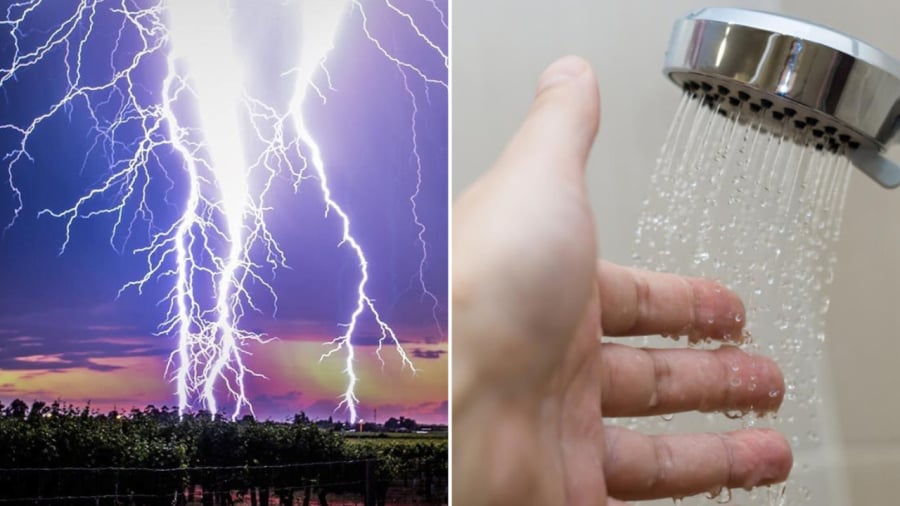Why You Should Avoid Showering, Washing Dishes, or Doing Laundry During Thunderstorms
It is common knowledge that during a storm, one should avoid standing near windows or taking shelter under trees. But did you know that it is equally important to refrain from activities that involve contact with water, such as showering or washing dishes?
According to experts, there are certain risks associated with using water sources during thunderstorms. The Centers for Disease Control and Prevention (CDC) in the United States advises against any contact with water, including showering and washing dishes, to prevent the risk of lightning strikes.
In a statement, the CDC warns: “Do not shower, bathe, wash dishes, or come into contact with plumbing during a thunderstorm. Lightning can travel through a building’s plumbing. While plastic plumbing is less conductive than metal plumbing, it is still best to avoid contact with the plumbing and flowing water during a storm.”

Avoid showering, washing dishes, and doing laundry during thunderstorms.
The agency also recommends staying away from porches, balconies, and refraining from going near windows and doors during thunderstorms. Additionally, it is advised to avoid lying on concrete floors or leaning against concrete walls during such times.
Furthermore, it is crucial to stay clear of electronic devices connected to electrical outlets, and corded telephones should be avoided. Mobile phones and cordless phones are considered safe to use indoors as long as they are not connected to an electrical outlet for charging.
When lightning strikes a house, the electricity tends to follow the path of least resistance to the ground. Metal wires and water pipes provide a convenient pathway for the electricity to travel downwards. Showerheads, combining both metal and water, become ideal candidates for electrification.
While being indoors during a lightning strike reduces the likelihood of severe injury compared to a direct strike, it is challenging to determine the extent of harm one might sustain in such an incident.
Just How Powerful is a Lightning Bolt?
According to the National Weather Service in the United States, a lightning bolt striking the ground can heat the surrounding air to temperatures of 50,000 degrees F (27,760 degrees C). This is five times hotter than the surface of the sun.
Immediately after the flash of light, the air quickly cools and contracts. This rapid expansion and contraction create a sound wave, resulting in the thunder we often hear.
Lightning can be deadly to humans in several ways. A direct strike usually results in instantaneous death, and survival is exceptionally rare. Additionally, indirect strikes can occur when a person comes into contact with a car or other metal object that has been struck, leading to soft tissue injuries, skin burns, and more severe consequences such as brain and organ damage.
The electric current from lightning can travel through the ground and jump up to strike people and objects nearby. It can also transfer from one object to another.
The National Weather Service also provides a method to estimate a safe distance from lightning strikes to minimize their impact. Here’s how it works: Count the number of seconds between the flash of lightning and the resulting thunder, then divide that number by five. Every five seconds is equivalent to one mile (approximately 1.6 km); 15 seconds equals three miles (approximately 4.8 km). If there is no delay between the flash and thunder, you are likely very close to the lightning strike.
Lightning Safety: Protect Yourself from Nature’s Fury’>The Ultimate Guide to Lightning Safety: Protect Yourself from Nature’s Fury
The arrival of the stormy season brings with it a deluge of refreshing showers, a welcome respite from the heat. However, it also brings the hidden danger of lightning strikes. Fear not! This article will reveal the ultimate guide to staying safe during this stormy season, ensuring you emerge unscathed from the tempestuous weather.

































